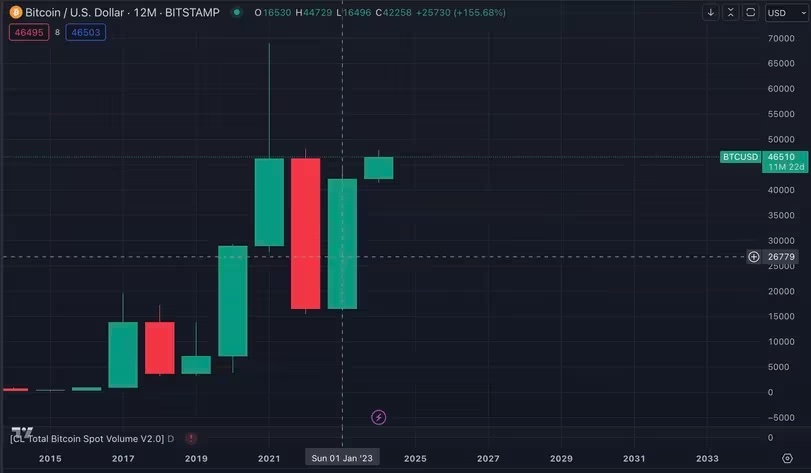
- Bitcoin ETFs, which were just approved by the U.S. Securities and Exchange Commission (SEC), are highly anticipated to revolutionize crypto investment.
- Gold ETFs transformed the gold market two decades ago, causing a huge spike in gold prices, and some experts think Bitcoin ETFs could do the same.
- Standard Chartered expects the price of Bitcoin to double to $100,000 this year.
Bitcoin exchange-traded funds (ETFs), which just received SEC approval on January 10, have been heavily promoted by those excited about opening up crypto investing to the general public. ing.
But in the world of finance, there’s always the risk that the latest thing will be a dud. Meme stocks like GameStop, AMC, and Hertz, for example, have gained a cult following during the pandemic and their stock prices have skyrocketed. However, it was only a temporary fad.
The precedent of gold ETFs
However, sometimes they gain a lot of popularity. When gold ETFs were introduced 20 years ago, there was a lot of wildly optimistic predictions.
“It’s going to sell like crazy. It’s going to open up a new asset class for investors,” Jim Wiandt, a well-known figure in the ETF space, said of gold ETFs in November 2004.
He was right. More than $100 billion (approximately 14.5 trillion yen, equivalent to 145 yen to the dollar) is currently invested in gold ETFs traded in the United States, the world’s largest capital market. Thanks to ETFs, investing in gold is as simple as clicking a buy button in a regular brokerage account, without the need for a safe or armed guards.
After gold ETFs were introduced 20 years ago, gold skyrocketed. Standard Chartered, a major global bank, sees this as relevant history for Bitcoin ETFs as well.
In the seven years since gold ETFs were launched in the US in 2004, the price of gold has more than quadrupled. “We expect Bitcoin to enjoy a similar magnitude of price appreciation as a result of the approval of spot ETFs in the US, but our view is that the Bitcoin ETF market will develop more quickly, resulting in price appreciation. We believe this will be realized in a shorter period of time (one to two years).” The bank predicts that Bitcoin prices will rise to $100,000 by the end of 2024.
People ask me: What happened when the first gold ETF launched in the US? pic.twitter.com/wJSchhWHvy
— Matt Hougan (@Matt_Hougan) October 23, 2023
people ask me. What happened when the first gold ETF was launched in the US?
This is why some crypto observers are so excited about Bitcoin ETFs. A number of companies, including asset management giant BlackRock, have just received approval to offer Bitcoin ETFs in the US, but the investment ecosystem is already seeing an influx of institutional and retail capital. is expected.
“The first gold ETF definitely changed the industry because it made it possible to include gold in an investment portfolio for the first time,” said William Rhind, founder and CEO of independent ETF company GraniteShares. .
However, he continued, it is unclear whether Bitcoin ETFs will ever be able to match their gold ETF predecessors.
“Ultimately, the demand for a Bitcoin spot ETF will be less than the demand for a gold ETF because Bitcoin has always been digital and has not had the same market access issues as gold to purchase. ”
A Bitcoin spot ETF is a financial product that owns Bitcoin itself, as opposed to the Bitcoin futures ETF, which has been around for several years already, and some analysts say it could become a $100 billion product. It has the potential to develop. As a result, it is expected that there will be significant changes in the crypto asset industry.
Increase options for investors
Without Bitcoin ETFs, institutional investors would have few options for investing in Bitcoin, the world’s largest crypto asset.
Most do not have the infrastructure to hold Bitcoin directly or the ability to trade it on existing exchanges, so they use futures ETFs like ProShares’ BITO or the Grayscale Bitcoin Trust (GBTC). ), you will invest through a closed-end fund such as However, these options come with high fees and multiple disadvantages.
Just as the first gold ETF created in 2003 attracted billions of dollars worth of money into gold, a Bitcoin spot ETF could do the same.
Securities firm Bernstein predicts in a research report that the Bitcoin spot ETF market will reach 10% of Bitcoin’s market capitalization in two to three years. (approximately $900 billion).
Martin Leinweber, digital asset product strategist at MarketVector Index, said Bitcoin’s current exchange balance is worth about $47.5 billion, but if the ETF is approved, all exchanges currently have a He said there is a possibility that more than three times the amount of money will be collected in Bitcoin than currently held by Bitcoin.
The first gold ETFs increased demand for gold. Bitcoin spot ETFs could do the same. Since the first gold ETF was launched in 2003, the price of gold has jumped from about $332 to $1,800, and there are about 35 gold ETFs trading in the U.S. market. Gold ETFs have a total of $105 billion in assets under management (AUM).
Bitcoin soared 155% in 2023. Most of this increase came after BlackRock filed for a Bitcoin ETF in June. Bitcoin has risen from a low of around $25,500 on June 15 to around $46,000 today.

 Bitcoin will rise 155% in 2023 (TradingView)
Bitcoin will rise 155% in 2023 (TradingView)Lind explained that the main market for gold ETFs is professional investors, such as financial advisors and asset managers, who are now able to hold gold in their portfolios for the first time.
In other words, demand for gold ETFs had been building up tremendously for some time, and that was reflected in AUM exponentially in a fairly short period of time.
Reinweber said the approval of a traditional institutional Bitcoin spot ETF is an important validation for the crypto space.
“This move could position Wall Street as a more dominant player in the global crypto space, as the US currently lags behind other countries in terms of physical Bitcoin ETFs.”
Currently, Bitcoin ETFs already exist in Canada and Europe. However, the European Jacobi ETF has seen weak trading volumes since its launch in August, according to data from Euronext.
Financial institutions like BlackRock may advise clients to allocate a portion of their portfolio to Bitcoin ETFs.
“If financial advisors and institutional investors find Bitcoin ETFs as liquid and convenient as the current popular ETFs, there is a good chance they will allocate around 1% or more. ” points out Reinweber.
“It’s not far-fetched to imagine a scenario where a traditional financial company recommends a small allocation to crypto assets through an ETF,” agreed Conor Ryder, head of research at Ethena Labs. do.
He added: “From an overall portfolio allocation perspective, a small allocation to volatile assets with asymmetric upside makes a lot of sense, and now you can recommend your own ETF and reap the fees.” I can do it,” he continued.
Strengthen your Bitcoin position
Bitcoin ETFs represent the convergence of the historically separate worlds of crypto assets and traditional finance (TradFi). Mona El Isa, CEO of Avantgarde, acknowledged the potential impact of the approval of the Bitcoin Spot ETF. This has huge implications for the industry, potentially bringing billions of dollars into the market as investors seek exposure to Bitcoin through trusted, regulated products. It’s sexual,” he said.
Since Bitcoin ETFs directly hold the underlying assets when they are created, El Issa said there could be significant demand for Bitcoin itself.
“As more investors, including institutional investors like BlackRock and Fidelity, look to hold Bitcoin in ETFs, the value of Bitcoin could rise as a result. This could have a knock-on effect and further strengthen Bitcoin’s position in global finance.”
In terms of the balance of power, the approval of Bitcoin ETFs symbolizes “the growing acceptance of crypto assets within traditional finance,” El Issa adds.
“It could strengthen the collaboration between crypto assets and Wall Street, and ultimately reshape the dynamics of the industry as we know it.”
Before the advent of Bitcoin ETFs, the next best option was Grayscale Bitcoin Trust (GBTC). GBTC has approximately $30 billion in assets under management. Despite being harder to buy and less attractive than ETFs, GBTC’s popularity suggests there may be significant appetite for a physical Bitcoin ETF.
“There is no doubt that there is demand for Bitcoin ETFs, but the question is how much investor appetite or enthusiasm for Bitcoin will we see after the recent turmoil in the crypto industry?” Lind said. It pointed out.
|Translation and editing: Akiko Yamaguchi, Takayuki Masuda
|Image: Shutterstock
|Original text: Why Are Bitcoin ETFs Such a Big Deal? Gold Provides a $100 Billion Answer
The post Why is there so much fuss about Bitcoin ETFs? What answers does the 14.5 trillion yen gold ETF provide? | CoinDesk JAPAN appeared first on Our Bitcoin News.

 1 year ago
166
1 year ago
166














 English (US) ·
English (US) ·